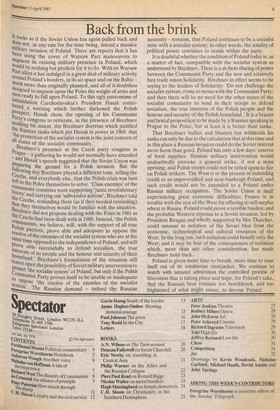Back from the brink
It looks as if the Soviet Union has again pulled back and does not, as any rate for the time being, intend, a massive military invasion of Poland. There are reports that it has been using the cover of Warsaw Pact manoeuvres to augment its existing military presence in Poland, which Would be nothing but prudent for it to do. With its Warsaw Pact allies it has indulged in a great deal of military activity around Poland's borders, in its air space and on the Baltic Theh more than originally planned, and all of it doubtless "esigned to impress upon the Poles the weight of arms and hien ready to fall upon Poland. To this ugly pantomime of intimidation Czechoslavakia's President Husak contributed a warning which further darkened the Polish rospeet. Husak chose the opening of his Communist r arty 's congress to reiterate, in the presence of Brezhnev n°dding his assent, the Brezhnev doctrine which justified the Russian tanks which put Husak in power in 1968: that 'the protection of the socialist system is the joint concern of all states of the socialist community.' Erezhnev's presence at the Czech party congress in 'ague a gathering he would not normally have attended and Husak's speech suggested that the Soviet Union was preparing the ground for a Polish invasion. But the 617"i°wing day Brezhnev played a different tune, telling the 1„,eens, and everybody else, that the Polish crisis was best :" to the Poles themselves to solve. 'Class enemies' of the 1rimunist countries were supporting 'junta revolutionary Trees' and carrying out 'subversive actions', Brezhnev told title Czechs, reminding them (as if they needed reminding) at they themselves would be familiar with the situation. 45.rezhnev did not propose dealing with the Poles in 1981 as the Czechs had been dealt with in 1968. Instead, 'the Polish e_nmniunists, we believe, will, with the support of all true rrolish patriots, prove able and adequate to oppose the _esolve of the enemies of the socialist system who are at the same time opposed to the independence of Poland, and will rmve able successfully to defend socialism, the true interests of its people and the honour and seCurity of their inenmeland.' Brezhnev's formulation of the situation still ayes open the possibility of Soviet military intervention to protect the socialist system' of Poland, but only if the Polish :tc(.1)mmunist Party proves itself to be-unable or inadequate sus.°13Pose 'the resolve of the enemies of the socialist "ern' The Russian demand indeed the Russian neCessity remains, that Poland continues to be a socialist state with a socialist system; in other words, the totality of political power continues to reside within the party. It is doubtful whether the condition of Poland today is, as a matter of fact, compatible with the socialist system as understood by Brezhnev. There is a de facto sharing of power between the Communist Party and the new and relatively free trade union Solidarity. Brezhnev in effect seems to be saying to the leaders of Solidarity: 'Do not challenge the socialist system; come to terms with the Communist Party; and then there will be no need for the other states of the socialist community to send in their troops to defend socialism, the true interests of the Polish people and the honour and security of the Polish homeland.' It is a brazen and brutal proposition to be made by a Russian speaking in Prague to the Poles; but at least it is better than tanks.
That Brezhnev bullies and blusters but withholds his tanks can only be due to the calculation that at this time and in this place a Russian invasion could do the Soviet interest more harm than good. Poland has only a few days' reserve of food supplies; Russian military intervention would undoubtedly provoke a general strike, if not a mass uprising; and Polish troops could not be relied upon to fire on Polish strikers. The West is in the process of extending credit to an impoverished and near-bankrupt Poland, and such credit would not be extended to a Poland under Russian military occupation. The Soviet Union is itself experiencing great economic difficulties; France is in trouble with the rest of the West for offering to sell surplus wheat to Russia. Poland could prOve a terrible burden; and the probable Western reponse to a Soviet invasion, led by President Reagan and wholly supported by Mrs Thatcher, could amount to isolation of the Soviet bloc from the economic, technological and cultural resources of the West. In the long run, such isolation could benefit only the West; and it may be fear of the consequences of isolation which, more than any other consideration, has made Brezhnev hold back.
Poland is given more time to breath, more time to ease itself out of its totalitarian straitjacket. We continue to watch with amazed admiration the controlled process of liberation that is taking place and hope, for Poland's sake, that the Russian bear remains too bewildered, and too frightened of what might ensue, to devour Poland.










































 Previous page
Previous page